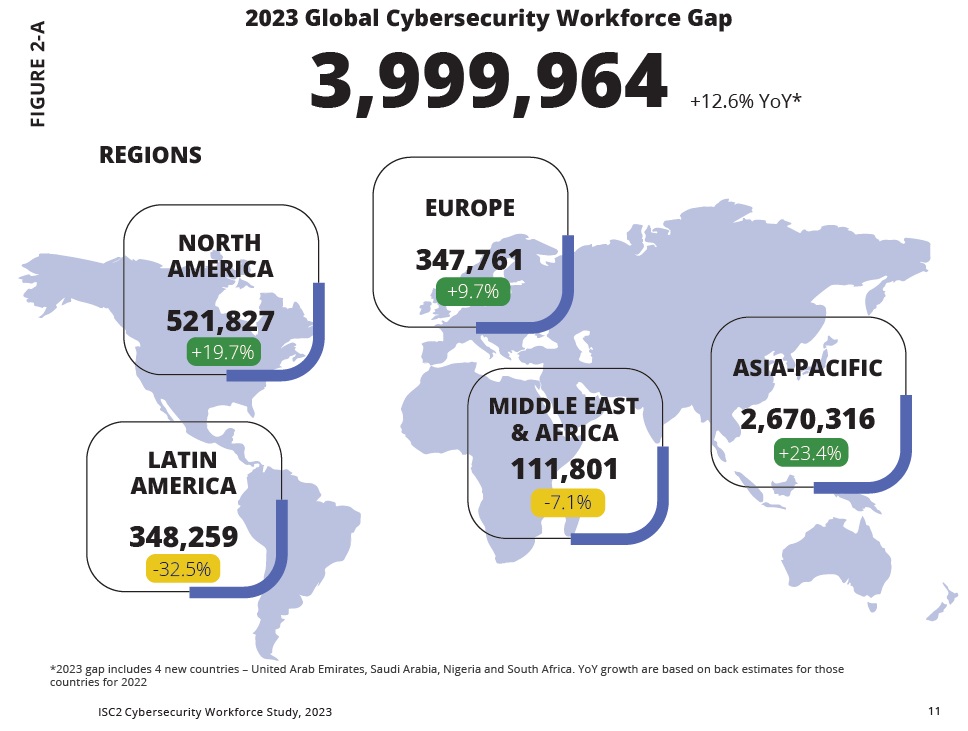Why should you enroll in a cybersecurity course?
Well, whether you’re a complete novice interested in breaking into this dynamic field or an IT professional aiming to specialize further, choosing the right cybersecurity course can be a pivotal decision in your career journey.
In this comprehensive guide, we will explore various facets of cybersecurity courses—from the different types of courses and their formats to the practical aspects, financial considerations, and the career benefits they offer.
Each section is designed to provide you with the insights needed to navigate the complex choices in cybersecurity training and to help you make an informed decision that aligns with your career aspirations.
If you’re ready, let’s get started with an exploration of the types of courses available and find the perfect fit for your professional goals.
Why Is It Important to Enroll in a Cybersecurity Course?
Cybersecurity courses equip you with crucial skills to safeguard sensitive information against cyber threats, which are becoming more sophisticated and frequent.
These courses cover a range of topics from securing networks and managing cyber incidents to understanding the ethical and legal implications of data protection.
If you’re entering the field of cybersecurity, it’s vital you’re provided the tools needed to address these security challenges effectively.
Furthermore, the demand for skilled professionals is growing rapidly as businesses and governments seek to secure their information systems.
Of course, the real reason why a cybersecurity course is important for you? By pursuing education in cybersecurity, you position yourself as a valuable candidate in a field that offers job security, growth opportunities, and a better salary.
Cyber Security Course and Jobs: What to Expect
As you decide on the specific course you’d like to attend, know that the salaries for cybersecurity jobs are also high.
Here are a few of the average annual salaries for IT Security jobs as listed by PayScale:
- Information Security Officer – $100,471
- Information Security Manager – $126,510
- Cyber Security Analyst – $81,366
- Cyber Security Engineer – $101,877
- IT Security Manager – $118,503
- Network Security Engineer – $97,638
- Ethical Hacker – $90,641
- IT Security Administrator – $71,870
- Cryptographer – $115,178
- Security Engineer – $100,496
- Penetration Tester – $94,787
- Forensic Computer Analyst – $77,786
4 Reasons Why You Should Enroll in a Cybersecurity Course
1. Plenty of Career Pathways
As I just mentioned, cybersecurity offers you a multitude of career paths. Network security and cloud computing to ethical hacking and digital forensics, you can start a career in any discipline that suits your evolving interests.
2. Cybersecurity is future-proof
Today, cybersecurity has become a necessity for both individuals and business organizations, and this fact is not going to change anytime soon. According to the US Bureau of Labor Statistics, jobs in information security are expected to grow 33 percent from 2020 to 2030.
3. The world needs Cybersecurity professionals
Because of the global cybersecurity talent shortage, demand for skilled cybersecurity professionals is growing faster than the rate at which people are gaining the necessary skills. And this situation is only expected to get worse.
According to ISC2 shortage of skilled IT security professionals is estimated at 4 million jobs as of 2023.

4. It Looks Great on Your Resume!
Having a course listed on your cybersecurity resume is a great way to show initiative!
Types of Cybersecurity Courses
Navigating through the sea of courses can be quite the adventure. Whether you’re just starting out or looking to specialize, there’s a course out there tailored just for you. Let’s break down a few options you might consider.
Cybersecurity Course with Certificate
Certifications can be a game changer. They not only enhance your resume but also validate your skills in the eyes of potential employers. Platforms like Coursera, Udemy, and even some prestigious universities offer various certificate courses in cybersecurity. These courses are designed to teach you the ins and outs of protecting information systems and can range from beginner to advanced levels.
AI Cybersecurity Course
As cyber threats become more sophisticated, the integration of AI into cybersecurity solutions is increasingly crucial. An AI cybersecurity course dives into how artificial intelligence can be used to detect, prevent, and respond to cyber threats more effectively. These courses are perfect for those looking to edge into a niche sector that’s poised for growth.
Cybersecurity for Beginners Course
Just starting out? No worries! Beginner courses are a fantastic way to get your feet wet. These courses often start you with the basics of cybersecurity principles and gradually delve into more complex topics. They provide a solid foundation in understanding threats, network security, and basic cyber defense mechanisms.
Each type of course serves a different purpose and caters to different career paths within the cybersecurity field. Whether you’re looking to certify your skills, dive into the new wave of AI-driven security, or start from scratch, there’s a course out there ready to set you on the right path.
Cybersecurity Course Formats
When it comes to learning cybersecurity, one size does not fit all. Everyone has their own learning style and life circumstances, so it’s great to have options.
Whether you prefer the structure of a classroom or the flexibility of online learning, let’s explore what’s out there.
Online vs. Offline Cybersecurity Courses
Luckily, you have the flexibility to learn virtually, but some still prefer the traditional classroom setting. Online courses offer the convenience of studying from anywhere and often allow you to pace yourself. On the other hand, offline courses provide face-to-face interaction and hands-on experiences which are invaluable for some learning styles. You’ll generally be able to find both formats, so you can choose based on what suits you best.
Duration-Based Courses
Not everyone can spend years studying. Fortunately, cybersecurity education comes in all shapes and sizes. Short courses, such as 6-week or 3-month programs, are great if you’re looking for quick, intensive learning or need to brush up on specific skills. For those ready to dive deeper, longer courses like a 6-month program are also available. These longer courses, aka cybersecurity bootcamps, often go more in-depth, preparing you for a range of challenges in the cybersecurity field.
Each format has its advantages, and the best choice depends on your personal needs, career goals, and the time you can commit. Whether it’s a short online course to get a quick certification or a long-term program make sure it aligns with your professional goals.
Specialized Cybersecurity Training
If you’re looking to dive deeper into specific areas of cybersecurity, specialized training can be the key to unlocking high-demand roles in the industry.
From ethical hacking to securing cloud environments, here’s a few courses that can help sharpen your expertise.
Cybersecurity Course Coursera
Coursera partners with top universities and organizations worldwide to offer a wide range of cybersecurity courses and specializations. What’s great is that Coursera’s cybersecurity courses are designed by experts from prestigious institutions, ensuring you receive up-to-date and high-quality education. These courses often include hands-on projects and peer-reviewed assignments that enhance learning through practical experience.
Best Cybersecurity Course on Udemy
Udemy offers a wide range of cybersecurity courses tailored to meet various skill levels and interests. Whether you’re a beginner or an advanced learner, Udemy has something that can suit your needs, including top-rated courses taught by industry experts. Here’s a direct link to every cybersecurity course on Udemy, some of which have 50K+ reviews.
Google Cybersecurity Course
Google, a leader in digital innovation, offers courses that focus on the fundamentals of cybersecurity, ensuring that learners not only understand the basics but also the latest trends and technologies in the field. These courses are crafted to provide a solid foundation in cybersecurity practices as applied in real-world scenarios. Here’s a link to Google’s cybersecurity course.
Entry-Level Cybersecurity Course
For those just starting out in cybersecurity, entry-level courses are essential. These courses typically cover the basics of network security, threat identification, and preventative measures to safeguard information. They provide a stepping-stone for those launching a career in cybersecurity.
So, whether you’re enhancing your skills with a course from Coursera, Udemy, learning about Google’s approach to security, or starting with the basics, there’s a path for everyone.
Detailed Cybersecurity Curriculum
A cyber security course curriculum is carefully designed to progressively build your expertise.
Starting with the basics, such as IT systems components and device security, you’ll progress to complex topics like system administration, forensic analysis, and incident response.
The curriculum might also cover essential policy, legal, ethics, and compliance aspects, grounding you in the broader implications of the field.
Here’s a breakdown of typical course components:
- IT Systems Components
- Device Security
- Cyber Threats
- System Administration
- Intro to Cryptography
- Cyber Defense
- Basic Scripting or Introductory Programming
- Fundamental Security Design Principles
- Information Assurance Fundamentals
- Basic Data Analysis
- Networking Concepts
- Policy, Legal, Ethics, and Compliance
For those interested in even more specialized topics, advanced modules are available.
These include Incident Response, Cryptography, Penetration Testing, Ethical Hacking, Cloud Security, Forensic Accounting and so on. If that sounds more interesting, you may want to pursue a full-on cybersecurity degree.
What are the subjects in cyber security course? That really depends on what course you’re taking, but it is important to understand the specifics of the cybersecurity course content and structure. It ensures that the program aligns with your educational and career aspirations, and whether you aim to be a cybersecurity generalist or a specialist in a specific area.
Admission Requirements for Enrolling in Cybersecurity Courses
Admission requirements for cybersecurity courses can vary from one educational institution (not just a university) to another.
Requirements for Cybersecurity Courses
The specific requirements for cybersecurity courses can vary widely depending on the level of the program and the institution offering it. Generally, for entry-level courses, you might not need any educational background. However, for more advanced courses, prerequisites might include foundational knowledge in IT or related fields.
Each institution has its own set of admission criteria, so it’s essential to review the requirements carefully before applying. Whether it’s submitting academic transcripts, a motivation letter, or proof of work experience, make sure you gather all necessary documentation.
Practical Aspects of Cybersecurity Courses
When choosing a cybersecurity course, practical considerations play a crucial role.
Whether you’re looking for a direct path to employment or prefer a course without heavy programming, understanding these aspects can help guide your decision.
Cybersecurity Course with Job Placement
For many, the ultimate goal of studying cybersecurity is securing a job. Courses that offer job placement services can be particularly attractive. These programs often have partnerships with tech companies and provide support like resume workshops, interview preparation, and direct job referrals after graduation. Enrolling in a course with job placement can significantly ease your transition from student to professional.
Cybersecurity Course Without Coding
Interested in cybersecurity but not keen on coding? No problem! There are plenty of cybersecurity courses that focus more on policy, governance, and risk management rather than coding. These courses are perfect if you want to work in cybersecurity but prefer to steer clear of the technical programming aspects. They cover crucial topics like legal issues, ethics, and compliance—essential knowledge for any cybersecurity professional.
Whether you’re leaning towards a hands-on technical role or a managerial position in cybersecurity, there’s a course that fits your career aspirations and learning style. By considering these practical aspects, you can select a program that not only matches your interests but also equips you with the skills needed in today’s job market.
Course Costs and Financial Considerations
Understanding the costs associated with cybersecurity courses and exploring affordable options can help you plan effectively and avoid surprises.
How Much Does a Cybersecurity Course Cost?
The cost of cybersecurity courses can vary widely depending on the institution, the course length, and the depth of study. Cybersecurity certificate programs, for instance, might cost only a few hundred dollars. Online courses generally offer a more budget-friendly alternative, with many free introductory courses available that can lead to more advanced studies, sometimes reimbursed by your company.
Cheap Cybersecurity Courses
If budget constraints are a concern, there are plenty of affordable cybersecurity courses available. I’ve discussed a few of them above. If you’d like to attend in person, try the courses offered by your local community college. Community colleges often offer lower-cost programs, and many online platforms provide courses at reduced rates or even free. These options make cybersecurity education more accessible to a wider audience, ensuring that financial barriers don’t hinder your entry into this vital field.
Looking to upgrade your career?
View our listing of cybersecurity jobs!
Conclusion: Your Pathway to a Cybersecurity Career
Deciding to enroll in a cybersecurity professional course is a big step towards a promising future in one of today’s fastest-growing fields.
We’ve covered everything from the types of courses available and their formats to the key considerations like practical benefits, costs, and the rewarding careers waiting for you.
Cybersecurity courses open doors to numerous opportunities, equipping you with the skills needed to protect businesses and governments from cyber threats.
Whether you’re starting fresh or looking to deepen your expertise, the information shared here should help you choose a course that fits your goals and interests.
Think about what you want to achieve, consider the different courses you could take, and take the plunge into a field that’s not just about securing a job but making a real difference.
Are you ready to start your journey in cybersecurity? Pick the right course, gear up for an exciting career, and make an impact in the tech world.



